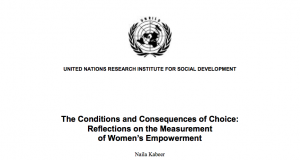‘The conditions and consequences of choice: reflections on the measurement of women’s empowerment’ UNRISD Discussion Paper no. 107 UNRISD, Geneva
 This paper is intended as a critical reflection on some recent attempts to construct indicators of women’s empowerment, focusing in particular on the meanings given to these measures and values embedded within them. It starts out by offering a three-dimensional conceptual framework for thinking about women’s empowerment: “resources” as part of the preconditions of empowerment; “agency” as an aspect of process; and “achievements” as a measure of outcomes.
This paper is intended as a critical reflection on some recent attempts to construct indicators of women’s empowerment, focusing in particular on the meanings given to these measures and values embedded within them. It starts out by offering a three-dimensional conceptual framework for thinking about women’s empowerment: “resources” as part of the preconditions of empowerment; “agency” as an aspect of process; and “achievements” as a measure of outcomes.
It goes on to consider the ways in which these different dimensions have been measured by economists, demographers, sociologists and feminists. On the basis of this discussion a number of key methodological points are made, in particular, the need for triangulation of measures to ensure that indicators mean what they are intended to mean.
The paper then turns to the role of values in the choice and interpretation of indicators, both the values of “insiders”—those whose lives are under scrutiny—and the values of those who are engaged in the measurement exercise. It points to the importance of ensuring that etic judgements are informed by, and sensitive to, emic values if the voice and agency of subordinated groups is not to be suppressed by powerful outsiders who may have only a tenuous grasp on their realities.
[gview file=”http://www.unrisd.org/unrisd/website/document.nsf/ab82a6805797760f80256b4f005da1ab/31eef181bec398a380256b67005b720a/$FILE/dp108.pdf”]



